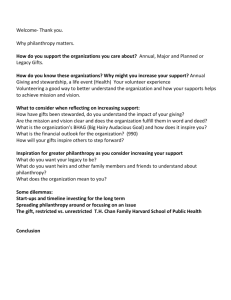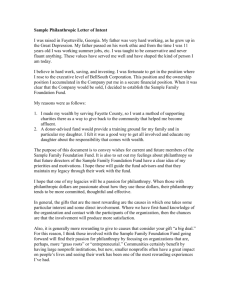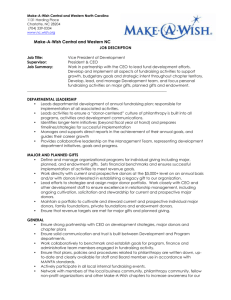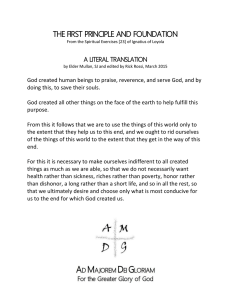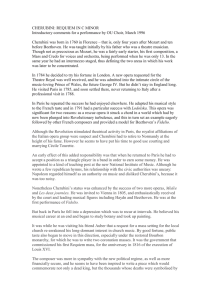Document 11321810
advertisement
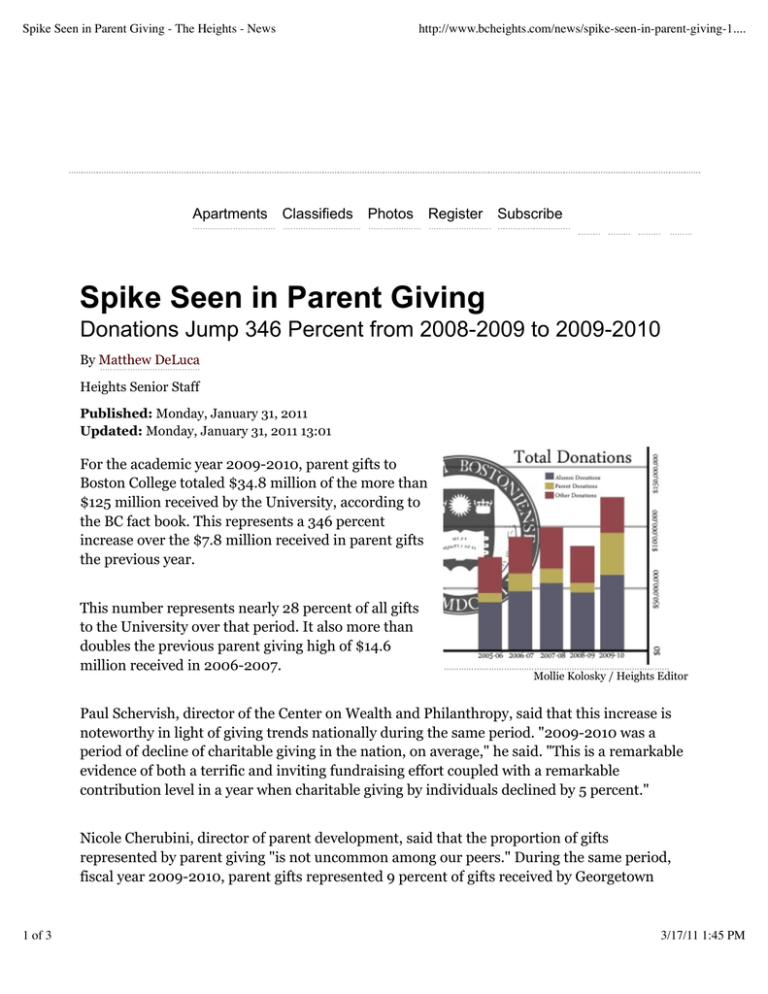
Spike Seen in Parent Giving - The Heights - News http://www.bcheights.com/news/spike-seen-in-parent-giving-1.... Apartments Classifieds Photos Register Subscribe Spike Seen in Parent Giving Donations Jump 346 Percent from 2008-2009 to 2009-2010 By Matthew DeLuca Heights Senior Staff Published: Monday, January 31, 2011 Updated: Monday, January 31, 2011 13:01 For the academic year 2009-2010, parent gifts to Boston College totaled $34.8 million of the more than $125 million received by the University, according to the BC fact book. This represents a 346 percent increase over the $7.8 million received in parent gifts the previous year. This number represents nearly 28 percent of all gifts to the University over that period. It also more than doubles the previous parent giving high of $14.6 million received in 2006-2007. Mollie Kolosky / Heights Editor Paul Schervish, director of the Center on Wealth and Philanthropy, said that this increase is noteworthy in light of giving trends nationally during the same period. "2009-2010 was a period of decline of charitable giving in the nation, on average," he said. "This is a remarkable evidence of both a terrific and inviting fundraising effort coupled with a remarkable contribution level in a year when charitable giving by individuals declined by 5 percent." Nicole Cherubini, director of parent development, said that the proportion of gifts represented by parent giving "is not uncommon among our peers." During the same period, fiscal year 2009-2010, parent gifts represented 9 percent of gifts received by Georgetown 1 of 3 3/17/11 1:45 PM Spike Seen in Parent Giving - The Heights - News http://www.bcheights.com/news/spike-seen-in-parent-giving-1.... University and 16 percent of gifts received by Tufts University. Over the years 2000-2008, parent giving to BC represented an average of 13 percent of total donations to the University. Cherubini said that the total for 2009-2010 was influenced by a small number of sizable donations. "Last year we were fortunate to have a few generous gifts as well as payments on pledges that had a significant impact on total parent support, accounting for a large percentage of the increase in support," she said in an e-mail. She said that she could not comment further on the size or number of individual gifts due to donor requests for anonymity. Current institutional fundraising priorities, such as the Light the World Campaign with its aim to raise $1.5 billion, have also had an effect on parent donors, Cherubini said. "We are in the middle of a capital campaign and parents recognize that, and that also is affecting these numbers." Cherubini said that the definition of a parent contribution had not changed, and that the high number was not attributable to a change in how parent gifts are tabulated. Thom Lockerby, vice president for development, said that the size of gifts received in any one category by a university fluctuates from year to year. "It is not uncommon for one donor cohort to increase relative to others from year to year," he said in an e-mail. "For example, in a given year, the percentage of support from parents, or from bequests, or from alumni celebrating reunions might spike due to a few large gifts. Because of this, we tend not to respond to single-year variations but instead focus on longer-term trends." "I would agree with them that a trend cannot be discerned from this," Schervish said. "Also, we don't know since this took place in the middle of a fundraising campaign." Schervish said that further explanation of the sudden rise in parent donations would be valuable. "It is a phenomenon that, when explained, would lead there to be a gain in knowledge for other universities, for Boston College, and for the field," he said. One of her office's priorities, Cherubini said, is to show parents who are already paying tuition that their donations have an effect. "I think it is back to parents recognizing that their support of the University makes a difference," she said. "We have many different opportunities for parents to be involved. We try to remain diverse in how we approach parents." Cherubini said that her office has tried to find ways to involve parents in all aspects of 2 of 3 3/17/11 1:45 PM Spike Seen in Parent Giving - The Heights - News http://www.bcheights.com/news/spike-seen-in-parent-giving-1.... university life. "This is hopefully something where parents feel engaged in all parts of the University, as well as philanthropy," Cherubini said. The work, she said, pays off. "36 percent of our parents make a gift to our University annually. That's among parents of current undergraduates." Lockerby said that his office works to keep parents informed about where there money is going. "It is very important to any donors that they understand the impact of their philanthropy. We communicate these effects to parents through dedicated and general reports and other publications, in on-campus meetings and events, and where possible by directly connecting donors with the objects of their support." In other cases, parent donors may be invited to campus to see first-hand the effects of their donation, Lockerby said. "For example, a parent donor who funds and endowed scholarship will be introduced to the students who are benefitting. Those who support faculty research receive copies of faculty books and other publications and may come to campus to attend lectures." 3 of 3 3/17/11 1:45 PM
